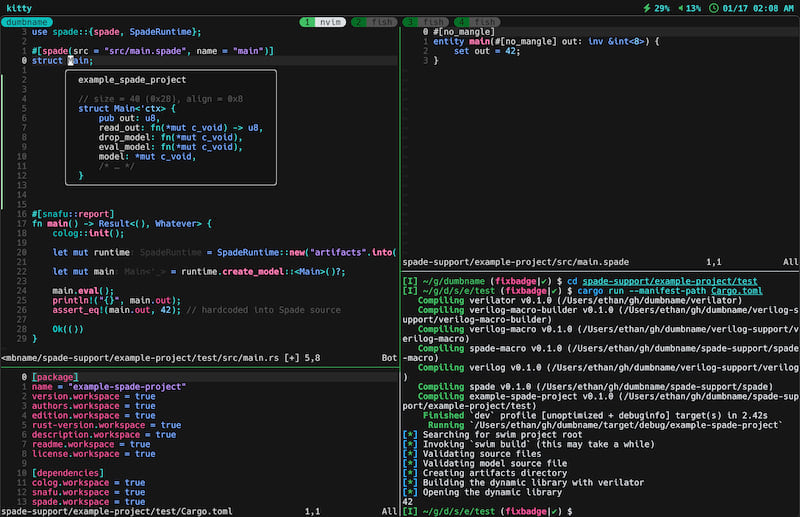10 unstable releases (3 breaking)
Uses new Rust 2024
| 0.6.2 | Apr 5, 2025 |
|---|---|
| 0.6.1 | Mar 30, 2025 |
| 0.5.0 | Mar 24, 2025 |
| 0.4.0 | Mar 18, 2025 |
| 0.1.0 |
|
#302 in Hardware support
62 downloads per month
1MB
2.5K
SLoC
marlin 🐟
Read the documentation | Read the API reference
Marlin is a really powerful library (and API) that lets you "import" hardware modules into Rust (or Rust functions into hardware modules!).
No precompilation step and manual updates with verilator harnesses; no
Makefiles and quirky decorators with cocotb testbenches. You're writing a regular Rust crate here.
Add this library to your Cargo.toml like any other library. Use hardware
modules as structs like any other Rust struct. Hook them up to tokio or
serde even. cargo test as hard as you want.
Marlin works out of the box on macOS and Linux (verified under continuous integration).

[!NOTE] The above screenshot is pre-0.1.0, so it's a bit out of date -- Marlin has improved a lot since then!
🔥 Motivation
Why does hardware testing suck? Consider the ways we have to test (System)Verilog:
- Test natively: Verilog is already a terrible enough language, and writing tests in Verilog is really annoying.
- Use Verilator harnesses: You have to first run Verilator to get the right headers, recompile manually every time, deal with raw pointers and C++, etc.
- Use cocotb: You have to use Makefiles or write your own Python runner, performance isn't the greatest, you get no LSP support for ports, etc.
The problem gets worse with custom HDLs, so they've come up with some creative solutions:
- Calyx: the canonical way of testing Calyx code is to read from JSON files representing byte arrays and write to JSON files representing byte arrays.
- Spade:
verilatorintegration involves absurd macro magic and usingcocotbrequires putting the design-under-test in a code comment. - Veryl: you literally write inline Verilog or Python. Yes, inside Veryl code.
Still, a lot of these are less than optimal.
✨ Features
- 🚀 Minimal overhead over directly using
verilator - 🔌 Works completely drop-in in your existing projects
- 📈 Safe VCD tracing support
- 🪙 Declarative API for usability + Dynamic API for programmability
- 🔄 DPI support in Rust: call Rust functions from (System)Verilog
- 🦀 Rust. Did I say Rust?
⚡️ Requirements
📦 Install
Marlin is on crates.io, so just use cargo add --dev marlin to add Marlin as a
dependency for your tests (dev-dependencies).
❓ How it works
I'll write more on this once I get further in the development process.
The TLDR is procedural macros + dlopen.
There are some stub pages in the work-in-progress internal section of the documentation, such as this page.
Hardware simulation tools are slow! How does Marlin deal with that?
Simulation tools take an absurd amount of time to run. For example, when you use Marlin in a Spade project, it calls out to:
swim build, which recompiles the entire Spade compiler from sourceverilator, which compiles and links C++ code
Marlin automatically runs them with all the right flags and arguments --- and it caches and only invokes them when needed.
🌎 Related
- verilated-rs is a super cool library that uses a build script to statically link in verilated bindings, but is unmaintained for years as of writing this.
🔒 License & Legal
Marlin is licensed under the Mozilla Public License 2.0. This license is similar to the Lesser GNU Public License, except that the copyleft applies only to the source code of this library, not any library that uses it. That means you can statically or dynamically link with unfree code (see https://www.mozilla.org/en-US/MPL/2.0/FAQ/#virality).
I use cargo-deny (see the
deny.toml to ensure no licensing violations occur. I also check
this on CI to prevent merging any new dependencies or dependency updates that
introduce incompatible licenses.
Verilator
Verilator is licensed under the Lesser GNU General Public License 3.0. However,
Marlin will dlopen Verilated code, which is permitted via this clause:
- Use a suitable shared library mechanism for linking with the Library. A suitable mechanism is one that (a) uses at run time a copy of the Library already present on the user's computer system, and (b) will operate properly with a modified version of the Library that is interface-compatible with the Linked Version.
Through VerilatorRuntimeOptions::verilator_executable,
you can specify your own interface-compatible Verilator wrapper, enabling (b).
Dependencies
~19–47MB
~729K SLoC